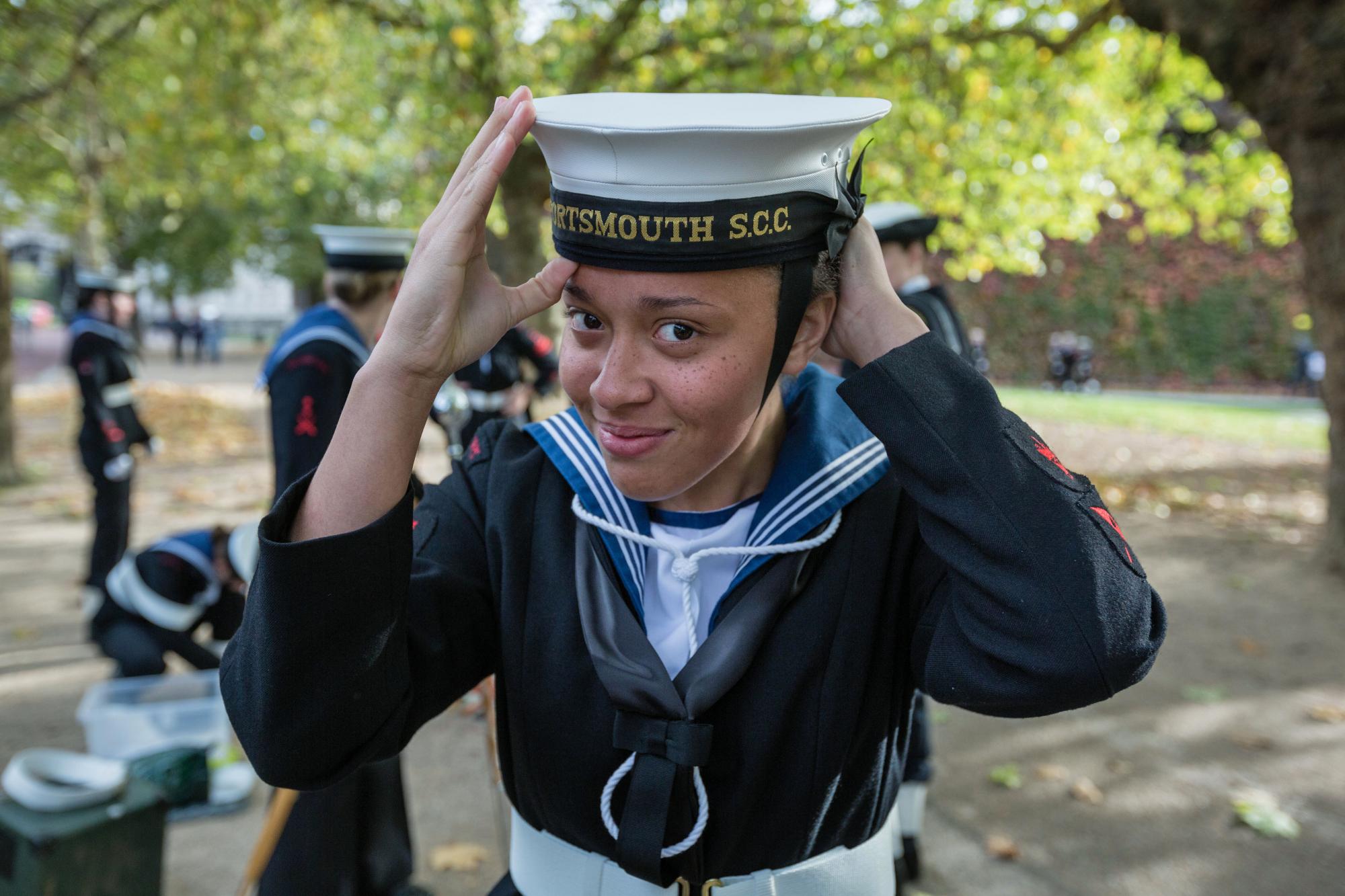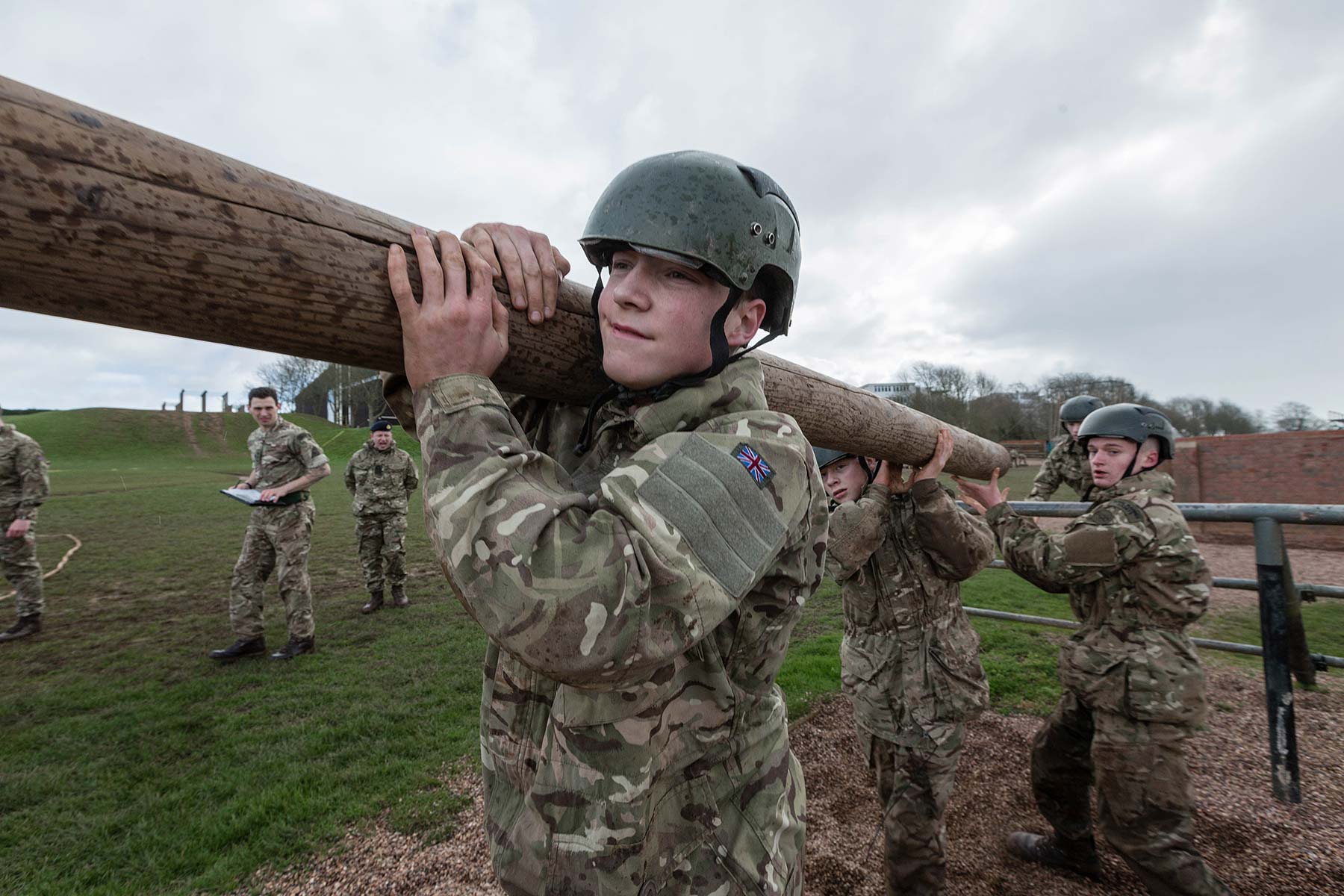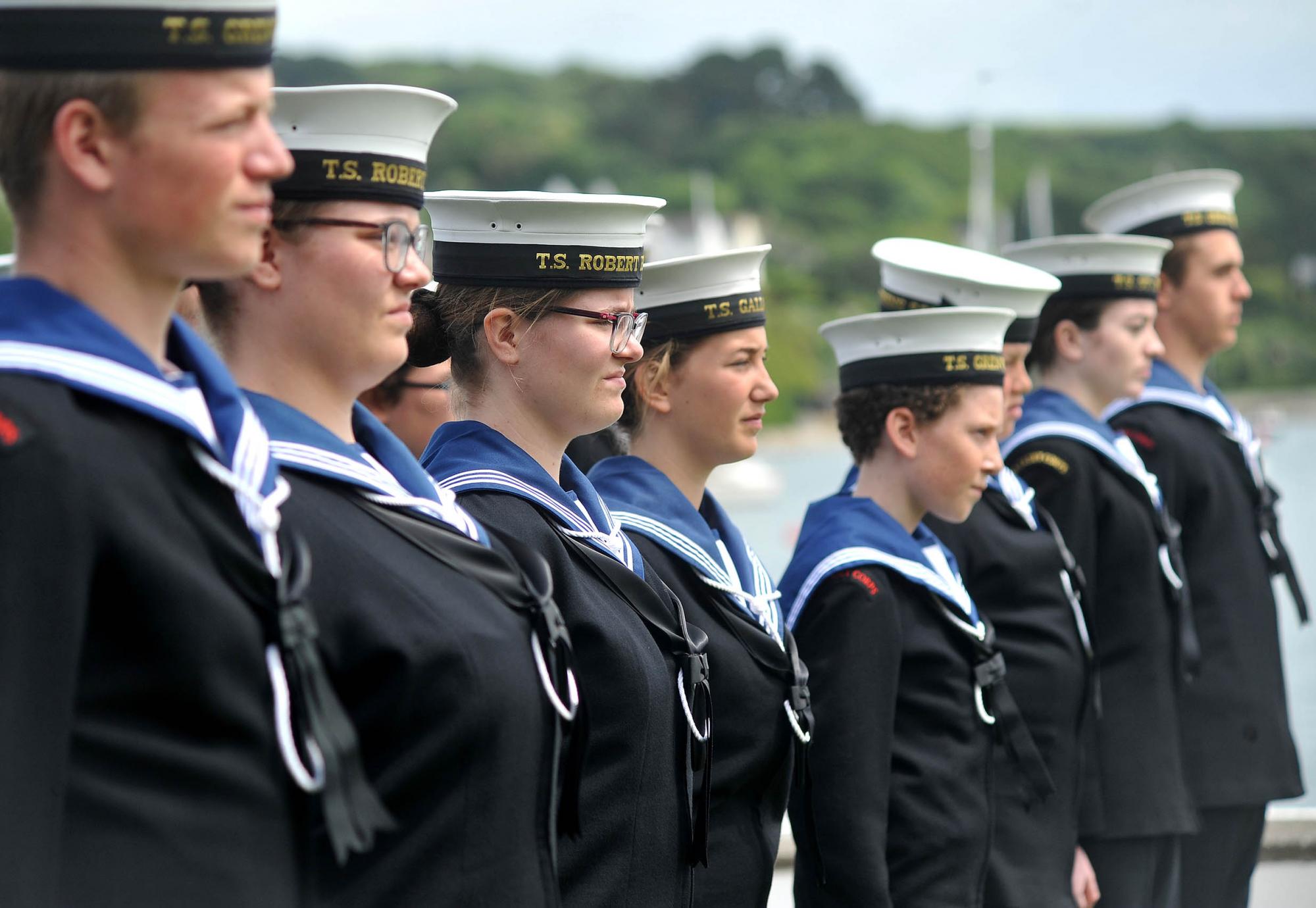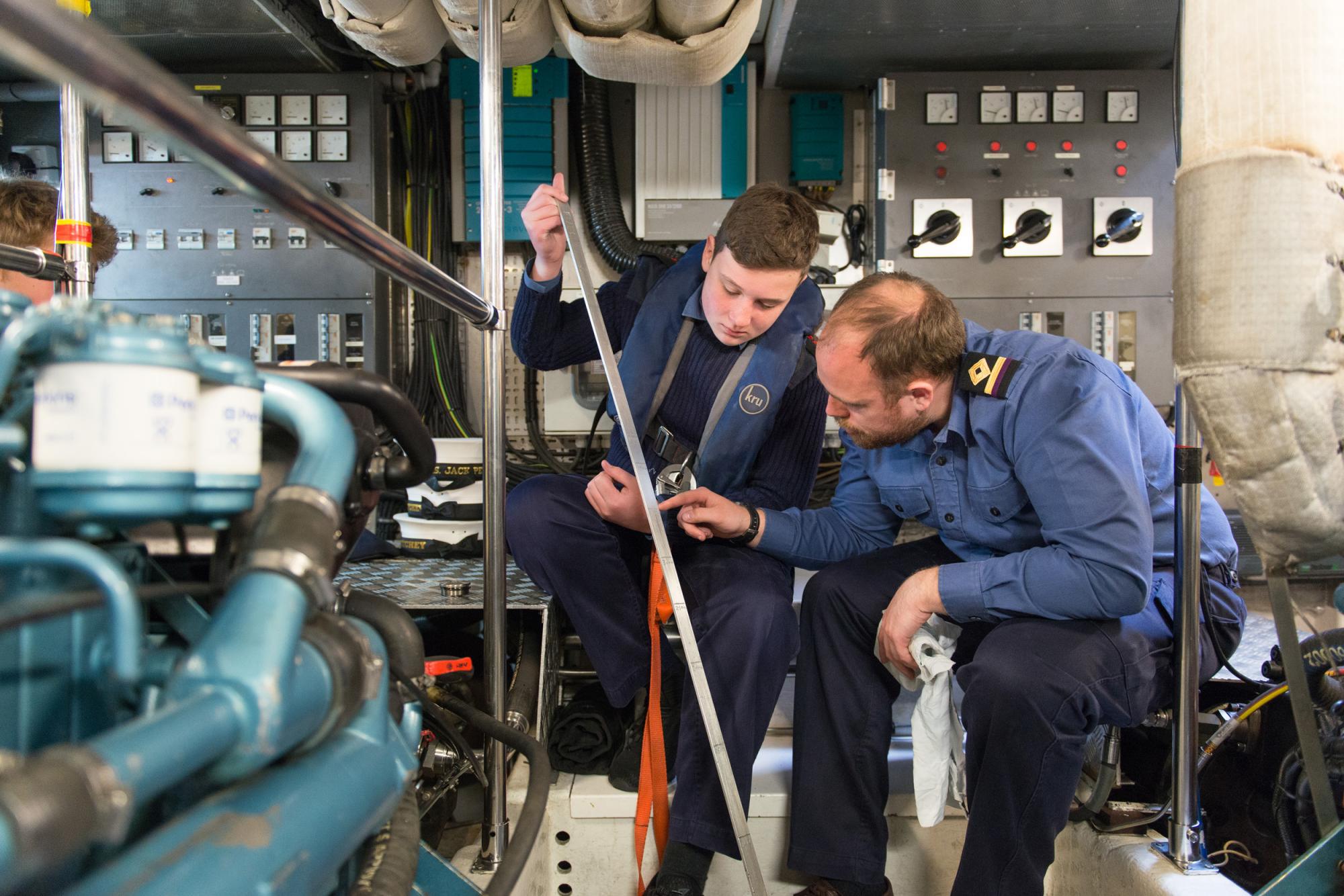Confident
"Sea Cadets has given me confidence. I was as shy as anything before I started. It held me back. As soon as someone told me to take charge, I’d cry! Now I talk to anyone. I never used to speak to anyone at school. If a teacher asked me a question, I’d say I didn’t know, even if I did. Cadets changed that"
Bonnie, volunteer, 24, Oxford
- Young people develop the confidence at Sea Cadets to help set them up to enjoy life and get through challenges
- They feel confident in new situations
- They’re able to ask for and get the information they need
- They come across well when meeting new people – in training, at uni or when going for a job

Feeling more in charge of themselves
"I’m a young carer. When I come here, it’s the one place that hasn’t changed in my life. It’s a secure place, a home away from home.
My dad used to push me, he was always into discipline. But the last few years he’s been very ill, so Cadets has been a bit of a Dad to me."
Kate, 14, Salford
- Sea Cadets develop great habits and thinking that last a lifetime
- They often feel clearer about to get what they want from life
- They’re better equipped for making a good impression in interviews because they learn how to speak confidently and clearly in front of others
A leader people want to follow
"You have lots of opportunities to take responsibility for younger cadets. To see what you’re capable of."
Jess, 17, Oxford
- Stepping up when a leader’s needed becomes less scary
- Sea Cadets learn how to support people who are less experienced
- This can help with captaining a sports team, getting elected to do something they feel passionately about, or standing out in that precious first job interview
Comfy speaking to anyone
"Through Cadets, you see other people talking, and see how they do it."
Jamie, 13, Huyton
- Young people leave us able to walk into a room with their head up and make eye contact with anyone
- They feel at ease speaking with people whose backgrounds may be different to their's
- They know how to speak and present themselves in different situations so they get heard, and get what they need

Brilliant team player
"We all support each other. When you’re in a job, you’ll be able to support people who can’t do it, and you know how to focus on something."
Liberty, 13, Whitstable
- Sea Cadets learn to be exceptional team members
- They go the extra mile to get the job done
- They appreciate other people’s strengths, and enjoy working with them
- Pride in not letting people down means becoming someone people know they can count on
- And in return, young people will find they get loyalty in return
Skilled
"I never thought I’d have the qualifications I have got through Sea Cadets. In just four years, it’s completely changed me."
Ryan 17, Oxford
- Sea Cadets achieve qualifications to show what they’re made of
- Everyone gets a chance to stand out, whether or not they shine at school
- You learn that you might have to try more than once at something, but you’ll always be helped to get there
- As young people move out into the world, they will have built up a CV that shows they’re focused, a team player, and never give up

Someone with positive habits and thinking
"Learning discipline has been the biggest thing for me. I used to be a bit immature, I’d really mess around in school and used to get into trouble."
Josh, 16, Huyton
- It starts with small steps like polishing boots, but before they know it, teenagers become more organised and focused at home and at school too
- Through the kinds of adventure, Sea Cadets have, young people, become more determined, perseverant and able to get what they want in life
- Listening and learning at school becomes easier, and getting onto that training course
- And the habits and thinking developed at Sea Cadets will help young people to get and keep a job
Adaptable
"To learn to take instruction correctly is important for keeping a job."
Matt, 15, Oxford
- At Sea Cadets, it becomes easier to listen to others who know more than you, because you quickly see how it helps you get to where you want to go
- That can help at school because it reduces arguments with teachers, and makes learning easier and more enjoyable
- And it can help with getting a job because employers appreciate someone who can listen to instruction and take feedback
Motivated
"Drill is really hard and I wanted to give up, but you have to keep doing it. The staff don’t give up on you – at school some teachers do though."
Liberty, 13, Whitstable
- ‘I don’t give up’ is how Sea Cadets learn to think.
- Teenagers learn to love the feeling of achieving things that at first seemed difficult – by getting the help they need to try it different ways until they succeed
- Sea Cadets get into the habit of working a challenge through and finding the best way – whether it’s fixing a car, writing an essay or personal statement for uni, or finding a job
- Pride in not letting people down means becoming someone people know they can count on
- And in return, young people will find they get loyalty in return
How Sea Cadets helps longer term
School gets better
"I used to hang around the streets, play out every night. I was naughty and cheeky. Since Sea Cadets, it’s all stopped. And my grades at school have gone up quite a lot."
Louis, 13, Huyton
- Sea Cadets find it easier to listen and focus
- They become more organised, which will make keeping on top of schoolwork less stressful
- Preparing for exams should become easier
- Because Sea Cadets are used to speaking up in front of others, it becomes easier to stand up in class and give presentations
- Teenagers develop the confidence to put their hand up in class, answer questions and join in more
- Grades may get better

Getting that job gets easier
"You just have to do things you don’t want to sometimes. You’re part of a team, so you have to. There will always be someone above you at work, so you have to get used to it."
Jess, Oxford
- Sea Cadets know how to behave and speak in different situations, so people will welcome them
- They instinctively support colleagues to be the best they can be
- And be able to listen to instruction and accept feedback without being offended, so they can improve and do well
- Using initiative and focusing on the task is just what they do
- Sea Cadets know how to step up if leadership is needed, even if it’s scary
Challenges are overcome
"When you’re a grown up, you have to cope with what life throws at you, but that is less true for kids nowadays. If Sea Cadets can deliver resilience, it’s a very valuable life skill. To pick yourself up and try again."
Edward, parent of Henry, Oxford
- Sea Cadets are less likely to crumble in the face of challenges or the unexpected
- They know how to think their way through and pick themselves up
- They’re adaptable, and if they hit a brick wall, they’ll be more able to find a way around it
- Young people learn to enjoy being physically active, to stay fit and mentally able to face tricky things
Known for the right reasons
"If you want useful members of society, people who contribute to civil society, young people who understand the needs of people from 8 to 80, then invest in Sea Cadets."
OJ, mum of Serafina 15, Clapton
- Sea Cadets feel proud to be known for the right reasons where they live
- They pass on what they’ve learned at Sea Cadets to younger people and even become volunteer staff themselves
- They’re seen as someone reliable and asked to take part in their community


